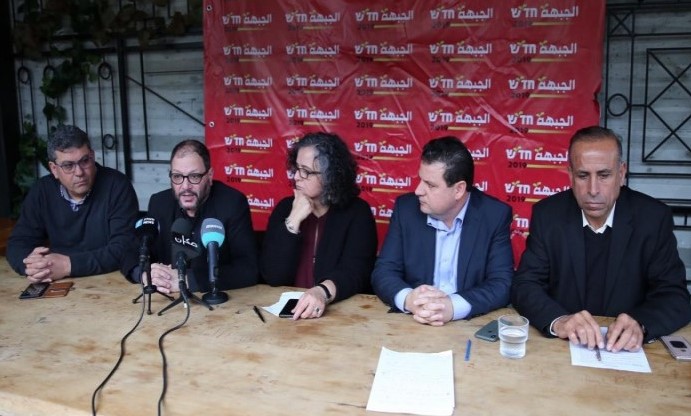Hadash (The Democratic Front for Peace and Equality – Communist Party of Israel) Ta’al, Balad and Ra’am (United Arab List) – are expected to announce a joint campaign for Israel’s September 17 election within the next couple of weeks. Communist Party General Secretary Adel Amer told the Communist daily newspaper Al Ittihad that the intensive talks among the four established parties should conclude with an agreement for a resumed merger within 10 days to two weeks.

Leaders of Hadash during a press conference in Haifa; from left to right: Secretary General of the Communist Party of Israel, Adel Amer, MK Ofer Cassif, MK Aida Touma-Sliman, MK Ayman Odeh, head of Hadash, and Mansour Dehamshe, Secretary General of Hadash. (Photo: Al Ittihad)
The parties have speeded up their negotiations in recent days and held discussions on Tuesday and Wednesday of this week (June 11 and 12), with the aim of wrapping up negotiations some time within in the second half of June.
Running together as the Joint List in the 2015 election brought the four parties 13 MKs making their coalition the third largest parliamentary bloc in the 20th Knesset.
However, after the failure of negotiations to perpetuate the Joint List in the April 2019 selection, they ran as two separate lists: Hadash-Ta’al which won six seats in the 21st Knesset and (four for the former and two for the latter) and four seats for Balad-Ra’am (two seats each). In other words, collectively the four parties garnered 10 Knesset seats in April compared to 13 four years earlier, a drop of 23% in their combined strength. Furthermore, Balad-Ra’am only barely managed to pass the electoral threshold of 3.25%; had they not, instead of 10 seats, the Arab population in Israel would have been represented by only six MKs.
The leaders and rank and file of these parties are well aware of these numbers, as they are of the consensus leading up to the April election that many Arab citizens were reluctant to vote precisely because of the breakup of the Joint List. Furthermore, with the electoral threshold of 3.25% ensuring that none of the four parties, were they to run independently, are assured of making it into the Knesset (and this is exactly why Avigdor Lieberman introduced legislation in 2014 to raise it from 2%), they are convinced that the ever-augmenting threat of Israel’s far-right demand that they reunite in campaign towards the September election.
In this fraught political reality, the four parties have already agreed that their representation in their renewed parliamentary bloc, should the negotiations succeed, will be based on the results of April’s election, in which Hadash won four seats and Ta’al, Ra’am and Balad each won two. For this reason, there are no major disagreements over the representation on the first 10 slots. The negotiations now mainly involve the party assignment for slots 11-14 in the hopefully soon to be renewed Joint List.


